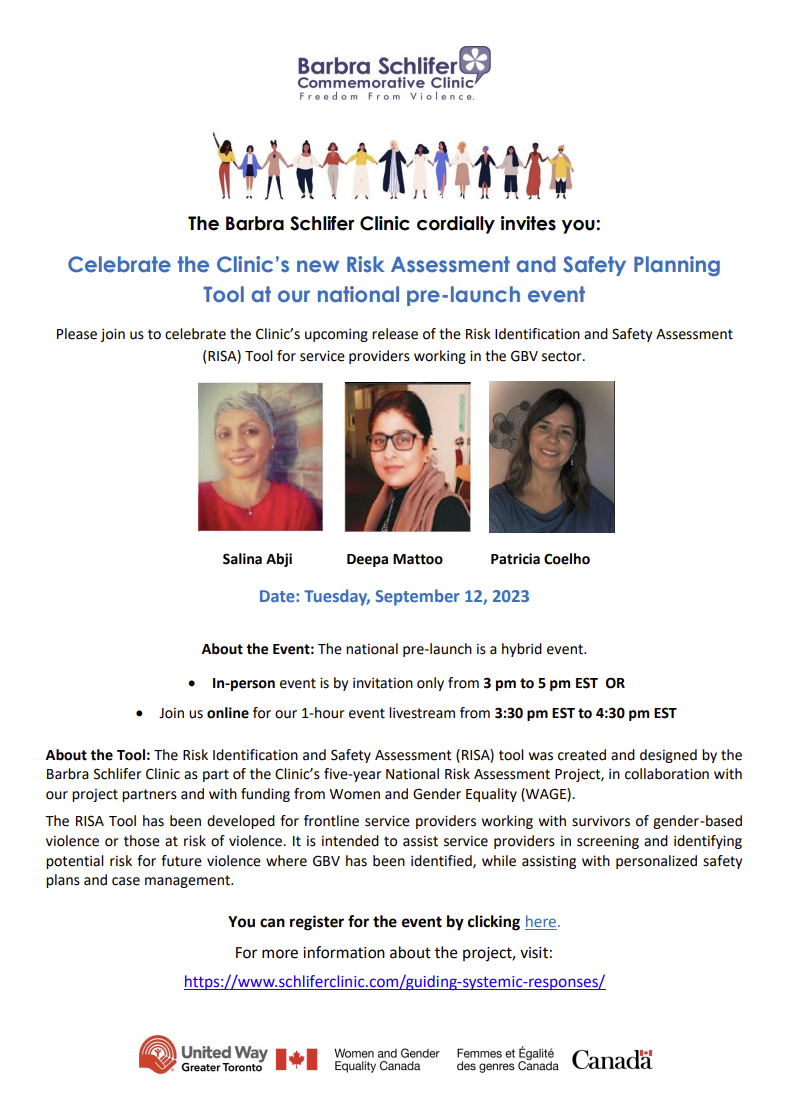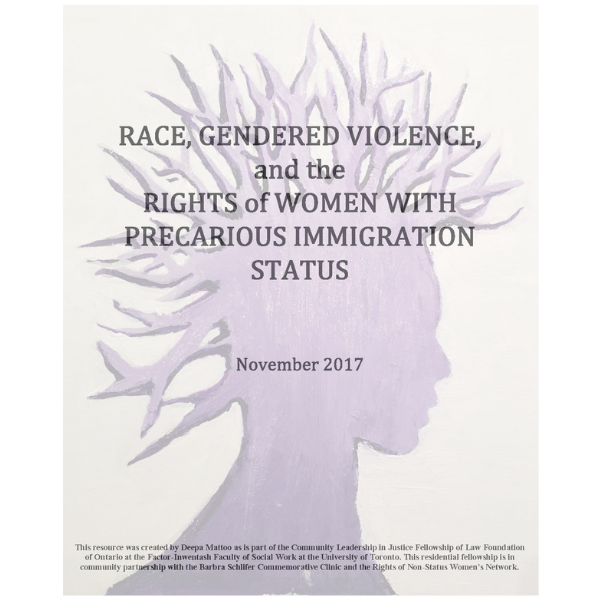Knowledge Sharing
The Clinic offers several resources that are available to download. In addition, we host several training courses, webinars, seminars, and events that are geared toward educating the public on issues relevant to gender-based violence. To learn more about our training opportunities, please Contact Us.
Monitoring Canada’s National Action Plan
The Barbra Schlifer Commemorative Clinic would like to thank the clinic’s 2023 summer law students, as well as the Blake’s summer students who worked to put this paper together. We would also like to thank Blake’s for supporting the work of the clinic through their pro-bono student placements.
This project was completed by Alexandra Nicu, Sophie Bender, Kvitlana Tsap, and Valerie Nwaokoro under the supervision of Deepa Mattoo, Executive Director of the Barbra Schlifer Commemorative Clinic.
Risk Assessment and Safety Planning Tool national pre-launch event
Please join us to celebrate the Clinic’s upcoming release of the Risk Identification and Safety Assessment (RISA) Tool for service providers working in the GBV sector.
Date: Tuesday, September 12, 2023
About the Event: The national pre-launch is a hybrid event.
- In-person event is by invitation only from 3 pm to 5 pm EST OR
- Use this Eventbrite link https://www.eventbrite.com/e/690089705887?aff=oddtdtcreator to register for our 1-hour event livestream from 3:30 pm EST to 4:30 pm EST
About the Tool: The Risk Identification and Safety Assessment (RISA) tool was created and designed by the Barbra Schlifer Clinic as part of the Clinic’s five-year National Risk Assessment Project, in collaboration with our project partners and with funding from Women and Gender Equality (WAGE).
The RISA Tool has been developed for frontline service providers working with survivors of gender-based violence or those at risk of violence. It is intended to assist service providers in screening and identifying potential risk for future violence where GBV has been identified, while assisting with personalized safety plans and case management.
Please email Patricia at [email protected] if you require language translation in French or accommodations for accessibility.

Trauma-Informed Evaluation, Learning & Leadership (TELL) Framework
The Clinic’s TELL framework helps guide the policies, tools, and practices used to understand program and service impacts and to enhance capacity to learn and grow in response to the evolving needs of the people and communities served.
Enhanced Safety: Risk Assessment Tool in Family Courts
The Clinic received funding from The Law Foundation of Ontario for a two-year project to create a risk assessment tool that will take into account the complex lived realities of survivors and current understandings of gender-based violence (GBV). The risk assessment tool takes into consideration physical, emotional, mental, social/cultural, financial, legal and spiritual abuse and will also take into account the multiple sources of oppression and systemic barriers that women experience.

Race, Gendered Violence and the Rights of Women with Precarious Immigration Status is a toolkit written for service providers who assist racialized women living with precarious immigration status.
This project aims to build the capacity of settlement workers, lawyers, and students to work with non-status, racialized women who have experienced gender-based violence. This training toolkit will provide information on issues affecting racialized women with precarious immigration status in Canada by exploring the relationship between race, gender, and immigration status.
This toolkit is one of the Community Leadership in Justice Fellowship of Law Foundation of Ontario outcomes at the Factor-Inwentash Faculty of Social Work at the University of Toronto. This fellowship is in community partnership with the Barbra Schlifer Commemorative Clinic and the Rights of Non-Status Women’s Network (RNSWN).
To provide feedback about this resource, please contact the Barbra Schlifer Commemorative Clinic at [email protected] or (416)-323-9149.
Resilient Threads Telling Our Stories
Hilos Resilientes Cosiendo Nuestras Historias
Carolina Paz Gana & M. Lynne Jenkins
[email protected]
[email protected]
Sewing is traditionally women’s work. Often characterized as homespun, even quaint, it is associated with the domestic sphere. What at first glance may appear charming belies the persuasive ways in which women work with textiles to depict apartheid in South Africa identity, forced migration, grass roots activism, encoded messages, and remembrance of murdered and missing indigenous women. Perhaps that is why the powers that be are mostly unaware of its subversive potential, and thankfully so, as this potential remains under the radar “sew” to speak while galvanizing those at the margins. How might sewing bring women together in a circle of care, give them a sense of belonging to a larger community that provides hope and meaning while creating the conditions for activism and social justice? Such gatherings of women allow for precisely the confluence of belonging, healing, and resistance.
